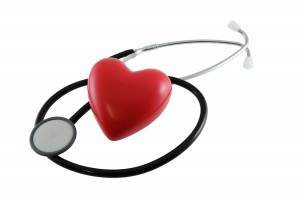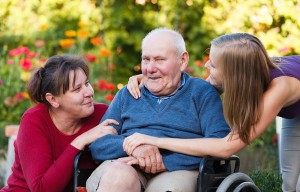Since February is heart month, this is a good time to discuss the effects of hormones on the heart. I believe that this is a timely topic to understand how we can protect ourselves from heart disease. During the 23rd Annual World Congress on Anti-Aging Medicine on Dec. 11-13, 2015 in Las Vegas Dr. Ron Rothenberg gave a talk entitled ”Hormones And The Heart”. He stated that he wanted to give an overview of the effects on the endocrine system and on the cardiovascular system, in particular the effect of testosterone and estrogen. Also discussed were the effects of thyroid hormones, growth hormone, vitamin D and melatonin. In the following I will summarize what he explained in detail.
Testosterone treatment in men
He stated that there has been some confusion about the protective effect of testosterone on the heart in men. But Dr. Sharma and colleagues who investigated 83,010 male veterans with documented low testosterone levels clarified this confusion with this large study.
One group received testosterone replacement therapy, another did not receive replacement therapy and one group received replacement with testosterone, but the testosterone levels did not normalize.
Mortality reduction with testosterone replacement
The observation time for the various groups was between 4.6 years and 6.2 years. The results were impressive. A comparison between the results of men on testosterone replacement and the results of men without testosterone replacement, showed that there was a 56% reduction in overall mortality. Furthermore, there was a reduction of heart attacks by 24% and a reduction of strokes by 36%. There was no difference between the control group without testosterone replacement and the partial testosterone replacement group where the testosterone levels did not come up. It is clear from this that with proper testosterone replacement where the physician monitors testosterone levels and corrects the levels, significant reductions in strokes and heart attacks can be achieved. The explanation for these findings is simple: both, brain cells and heart cells in males, have testosterone hormone receptors that need to be stimulated for full function.
Hormone replacement in women
This topic was confusing for many years because of the insistence of the medical profession to use horse estrogen extracts from pregnant mares (Premarin) and synthetic Provera (instead of bioidentical progesterone). These artificial hormone-like substances were used in the much-discussed Women’s Health Initiative (WHI).
Dr. Rothenberg said about this study that investigators used the wrong estrogen, the wrong progesterone, the wrong route of administration of estrogen (oral estrogen causes inflammation), and the wrong women at age 63 who already had cardiovascular disease and breast cancer.
Revisiting the Women’s Health Initiative
One important aspect that was learnt by re-interpreting the WHI was that when estrogen replacement was initiated right away when menopause started, the heart attack risk went down by 34%. Estrogen and Provera together reduced the risk only by 28% (Provera being the wrong hormone). Again, the explanation for this findings is simple: women have both estrogen and progesterone receptors in heart and brain cells, which want to be stimulated with the natural hormones. When estrogen is missing, women need bioidentical replacement of what is missing with estradiol transdermal creams. When a woman is progesterone-deficient, she needs replacement with bioidentical progesterone transdermal cream or with micronized progesterone orally.
Estrogen
KEEPS study
With regard to estrogen replacement the KEEPS study has shed a new light on what is going on with hormone replacement in women.
700 women in early menopause participated in this study. Treatment consisted of 0.45 mg of Premarin (still the wrong hormone) or 50 micrograms of transdermal estradiol (the right active human estrogen). Women also received 200 mg of micronized progesterone (Prometrium, the real human progesterone) for 12 days each month. After 4 years of observation there was no case of breast cancer, uterine cancer, heart attack, transient ischemic attack, stroke, or blood clots in veins between the three groups. Both Premarin and transdermal estrogen had slightly reduced coronary artery calcifications on CT scans compared to the placebo group without hormones. The Premarin group increased the triglyceride and the CRP (a measure of inflammation) levels while the transdermal human estrogen did not do that.
It is a disadvantage to the woman, if she does not receive bioidentical hormone replacement after menopause
Another study showed that due to the WHI study with the wrong synthetic hormones many women were fearful of starting estrogen replacement. The lack of hormone replacement with nature-identical hormones is responsible for the death of many women, who did not have the beneficial effects. They died of cancer and heart disease.
Dr. Rothenberg explained that this study and others have shown the following
- Bioidentical hormone replacement must be started immediately at or before menopause to have the best results in terms of cardiovascular and neuroprotective (Alzheimer’s) prevention.
- Oral estrogen induces inflammation, which causes heart attacks, strokes and venous thromboembolism (blood clots). To prevent this, estradiol must be given as a transdermal cream. This will avoid the first pass effect through the liver, which is the cause for inflammation. Transdermal estradiol does not have the first pass effect. Inflammatory cytokines are implicated in autoimmune processes, initiation of cardiovascular disease, osteoporosis and Alzheimer’s disease.
- If estrogen replacement is not done right away with the start of menopause, the estrogen receptor may get damaged, which means that when estrogen replacement is started at a later date, it is no longer effective.
Progesterone
Progesterone is the other female hormone that physicians often overlook. It balances the effects of estrogens, but the body can also metabolize it into estrogen or testosterone. Tiny amounts of testosterone are necessary for normal libido. In premenopause the ovaries already reduced progesterone production. She should receive progesterone replacement by transdermal bioidentical progesterone cream in premenopause.
Estrogen dominance needs to be treated with transdermal progesterone (or micronized oral progesterone). Both estrogen and progesterone can be accurately determined using a saliva hormone test. Blood tests are accurate for estrogen levels, but not for progesterone levels.
Thyroid replacement
Not infrequently thyroid tests are low (hypothyroidism) and cholesterol levels rise. This can lead to heart attacks and strokes. For instance, a slightly elevated TSH of 5.5 is associated with a total cholesterol level of 209 mg/dL, and a TSH level of 7.0 is associated with a cholesterol level of 270 mg/dL (normal less than 180 mg/dL). It is very important to detect hypothyroidism early and to treat it effectively to prevent cardiovascular disease. The active thyroid hormone is T3. Thyroid replacement has a stabilizing effect on the heart rhythm. It works together with testosterone in men and estrogen in women to stabilize metabolism of all cells, but in particular the heart muscle cells and brain cells. Hypothyroid patients are often depressed, but thyroid replacement lifts the depression. Cognitive deficits in patients with hypothyroidism are also remedied with thyroid treatment.
Growth hormone replacement
Growth hormone (GH) is important in childhood for bone growth and growth of all the organs. But GH still has an important function later in life. GH improves cardiac performance; it does so by thickening the wall of the left heart chamber, the main pump of the heart muscle. GH improves the contractility of the heart muscle, reduces the stress on the heart muscle wall and decreases vascular resistance. In animal experiments GH plays an important role in remodeling the heart after a heart attack.
GH deficiency occurs with aging; it leads to high LDL (bad) cholesterol and high triglycerides in the blood and increased fibrinogen, which causes blood clots. All of this increases the risk for heart attacks and strokes.
Age-related GH production declining
When people age, they lose GH production, which puts them at a considerable risk to get heart attacks and strokes, but they are also at a higher risk of serious falls due to muscle weakness and balance problems. When the doctor detects low IGF-1 levels in the blood and confirms low GH metabolites in a 24-hour urine sample, the time has come to do daily GH injections with human GH. You achieve this using a similar pen that is in use for insulin injections. The dosage is only between 0.1 mg and 0.3 mg per day before bedtime. This is remarkably effective not only for heart attack and stroke prevention, but also to treat muscle weakness, lack of mental clarity and general well being. Patients report that their joint and muscle aches disappear and they can engage in physical activities again.
Melatonin replacement
Most people think of melatonin as the “sleeping hormone”. The pineal gland releases melatonin. It rules overnight giving you a refreshing sleep. In the morning and during the day the light that enters your eyes inactivates it.
Melatonin is a powerful antioxidant, stabilizes the heart’s rhythm (anti-arrhythmic activity), is anti-inflammatory, anti-hypertensive and protects against heart attacks and strokes. People who have heart disease often have very low blood melatonin levels. Physicians can use melatonin intravenously in patients who have heart attacks. This will reduce the amount of damage to the tissue and stabilize the heart rhythm.
Age-related decline of melatonin production
Like with GH, the production of melatonin deteriorates significantly beyond the age of 40. Blood levels of melatonin can be easily ordered, and replacement is easy to do. 3 mg of melatonin taken at bedtime will be a sufficient dose for most people. You can take another 3 mg, if you wake up in the middle of the night. It will wear off within 3 to 4 hours.
Vitamin D replacement
The history of vitamin D3 is interesting. Vitamin D3, the active form of vitamin D has many actions: it stimulates the immune system and reduces the risk of infection, it reduces blood pressure, it reduces inflammation by reducing circulating cytokines, and it increases insulin sensitivity making insulin receptors more responsive.
Vitamin D3 binds to the vitamin D receptor, which is contained on all cells.
Many middle-aged and older people are deficient for vitamin D. A lack of it leads to higher mortality. Vitamin D helps to restore circulation in patients with ischemic heart disease. Vitamin D insufficiency causes high blood pressure, diabetes and metabolic syndrome. In addition, vitamin D deficiency also causes enlargement and thickening of the wall of your heart’s main pumping chamber, heart failure and chronic vascular inflammation.
More on the effect of vitamin D3 preventing mortality
A prospective 7.3-year study looked at the hazard ratios of the Third National Health and Nutrition Examination Survey (NHANES III) and linked mortality files with lower 25-hydroxyvitamin D levels. There were 33,994 persons part of the survey, of whom 1,493 died.
Below 10 ng/ml of 25-hydroxyvitamin D level the mortality was 2.5 fold for all causes and 3.08-fold for cardiovascular causes compared to those with levels of 100 ng/ml or higher.
The recommendation presently is to maintain serum levels at 60-80 ng/ml of 25-hydroxyvitamin D to prevent cardiovascular disease.
Conclusion
The following is important to remember regarding prevention of heart disease.
- Never smoke or if you do, quit smoking.
- Have your thyroid hormones checked. Thyroid hormones are important as an energy source for your heart muscle, and they lower LDL cholesterol levels.
- Your sex hormones matter: in men it is testosterone, in women estrogen and progesterone that support your heart.
Other effects on the heart
- Vitamin D is not only important when we grow bones as youngsters, but it continues to be important when we are older. It supports our heart and other body functions. It is an essential team player, as it prevents premature deaths. Blood levels of vitamin D are easy to measure.
- Two hormones leave us rapidly as we age: melatonin and human growth hormone. However, the physician can measure the levels of both hormones and if low he can replace what is missing.
- There are only two more things you need to do: eat a Mediterranean type diet and exercise on a regular basis. This will ensure your heart is still healthy in years to come.







